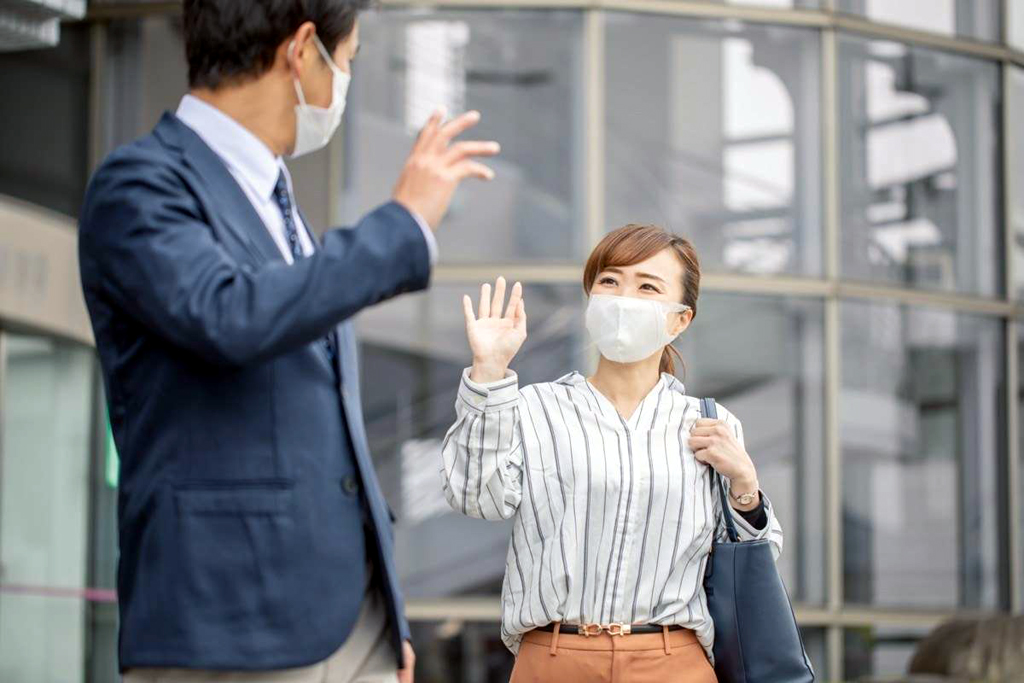![[feature] 7 New Etiquette Rules You Have to Follow Because of Coronavirus](https://blogger.googleusercontent.com/img/b/R29vZ2xl/AVvXsEhHvjKH6zxucM9SHDYkNyPka0xwVnyglTWh-0I-PToFFB4Ovj8fi_iJaJeMI85CaRhlJv1_pJMP5LbsUZZlVU7o8giQfYy8Qp1GSOM0zi96R7LR4X3ZE6g9I13lKVZenGovgDhxN7hAXso/s1600/mens.dearjulius.com.jpg) |
| © Shutterstock/Miguel Molinares |
By Sage Young, Best Life
Life has changed in a myriad of ways since the beginning of the pandemic. Working from home is much more common (as are kids and pets interrupting video calls), masks are encouraged in public places, and hugging friends is pretty much off the table. And as our way of life has changed, our manners must as well. COVID-19 has led to altering or all-out transforming many of the etiquette rules we rely on, from professional greetings to how much personal space we give others. Fortunately, experts have weighed in on the topic to ensure that we continue to respect each other even when we can't shake hands and our faces are covered. Here are seven new etiquette rules you have to follow because of coronavirus.
1
Four months ago, you probably wouldn't have dreamed of starting a meeting with an important client without shaking hands to say hello. Social distancing has made this show of respect obsolete, perhaps for the next few years. You don't have to worry about replacing your regular handshake if you're taking a virtual meeting, but what's the best way to greet someone in person? Waves have become more acceptable across the board.
"Perfect your waves (you know your 'professional wave,' your 'Zoom-meeting wave,' your 'I-love-you-Grandma wave,' your 'I-haven't-seen-you-and-I'm-trying-so-hard-not-to-hug-you wave')," The Emily Post Institute advises, "and use your tone of voice to match the occasion."
2
You don't realize just how much you rely on the bottom half of your face to communicate your mood or meaning until it's covered. Psychologist David Matsumoto runs Humintell, which specializes in training businesses and individuals in the power of body language. Speaking to The Atlantic, he said that, without the "visual cues" we transmit "from the bridge of the nose down," there is more opportunity for misunderstanding and garbled meanings. For this reason, people wearing masks should rely more on their words and their gestures to get their point across and confirm with others verbally that they've understood what they're trying to say.
3
The Emily Post Institute points out that contract tracing—the process of tracking down and alerting anyone who's been in a contact with a person who tests positive for the coronavirus—may become more prevalent as a strategy for slowing the spread. It may also affect the amount of information asked of you when you go out in public or attend an event. "We are considering the possibility that in the future a host's to-do list list or advice for making a restaurant reservation for a work lunch might involve contact info for potential contact tracing follow ups," the site says.
4
Not too long ago, it would have been considered rude to noticeably move away from someone in public or arc widely around them if you were sharing a sidewalk. Now, it's polite—especially if the individual is elderly, walking a dog, has a disability, or is walking with children. "If it's easy for you to be the person to step off the path or into the street […] to create space, by all means make the move and do so early so that the other person doesn't even have to guess at it," says the Emily Post Institute.
5
If you like to play host, then you know how frustrating it can be to get a late cancellation from even one guest. That's why it's usually frowned upon to rescind an RSVP — especially close to the actual event. However, etiquette expert Sharon Schweitzer told AARP that the pandemic has relaxed these rules. When backing out of big occasions, like weddings, she advises sending a gift immediately as well as a personal note of regret. For smaller get-togethers, "I'm so thrilled that you invited me, but I'm just not ready yet," is her recommended script.
6
Many people—especially those considered high-risk—are relying on delivery services more now than ever. And it's important to think about the person behind each of those deliveries. The New York Post advises avoiding extremely heavy items when ordering grocery delivery and opting for contact-free delivery (where your delivery person can leave your items at or inside your door) whenever possible. As these essential workers are taking on additional risk to get you your items, you should tip more than 20 percent if you can. Cash can carry the virus, so opt for entering it into the app or service you're using instead.
7
Maggie Craddock, who founded the coaching firm Workplace Relationships, told The New York Post that people working from home should be understanding of their coworkers' comfort level with conference calls. "Everybody's moods are so fluid right now. So ask your team if they'd prefer to do a call over video or by phone," she advised.
Even social video calls can be draining, especially for introverts. And with few excuses to be truly unavailable, people may feel pressured to participate when they're not in the mood. Clinical counselor Melissa Martin suggested to The New York Times that being up front with friends or family about your need for downtime is best. "There doesn't have to be a huge explanation," she said. "You can say honestly, 'I'm kind of stressed out and want some time to just watch Netflix or read a book, so I'll call you later.'"
Life has changed in a myriad of ways since the beginning of the pandemic. Working from home is much more common (as are kids and pets interrupting video calls), masks are encouraged in public places, and hugging friends is pretty much off the table. And as our way of life has changed, our manners must as well. COVID-19 has led to altering or all-out transforming many of the etiquette rules we rely on, from professional greetings to how much personal space we give others. Fortunately, experts have weighed in on the topic to ensure that we continue to respect each other even when we can't shake hands and our faces are covered. Here are seven new etiquette rules you have to follow because of coronavirus.
1
Keep your hands to yourself.
 |
| © Shutterstock/buritora |
"Perfect your waves (you know your 'professional wave,' your 'Zoom-meeting wave,' your 'I-love-you-Grandma wave,' your 'I-haven't-seen-you-and-I'm-trying-so-hard-not-to-hug-you wave')," The Emily Post Institute advises, "and use your tone of voice to match the occasion."
2
Use your words and your eyes.
 |
| © Shutterstock/Yogendras31 |
3
Permit personal questions.
 |
| © Shutterstock/GaudiLab |
4
Give a wide berth.
 |
| © Shutterstock/Wirestock Images |
5
You have the right to un-RSVP.
 |
| © Shutterstock/F8 studio |
6
Tip very generously.
 |
| © Shutterstock/Syda Productions |
7
Don't over-schedule video calls.
 |
| © Shutterstock/PhotobyTawat |
Even social video calls can be draining, especially for introverts. And with few excuses to be truly unavailable, people may feel pressured to participate when they're not in the mood. Clinical counselor Melissa Martin suggested to The New York Times that being up front with friends or family about your need for downtime is best. "There doesn't have to be a huge explanation," she said. "You can say honestly, 'I'm kind of stressed out and want some time to just watch Netflix or read a book, so I'll call you later.'"






















